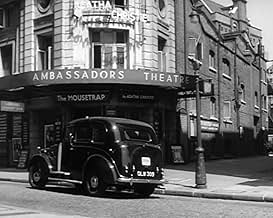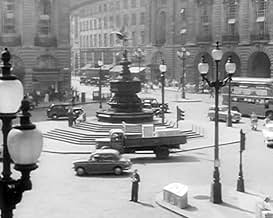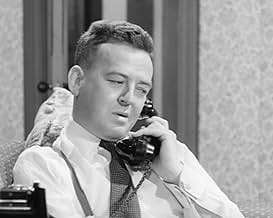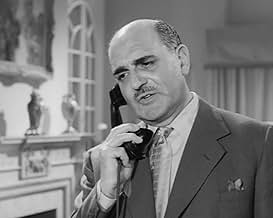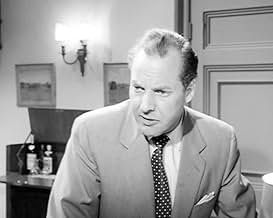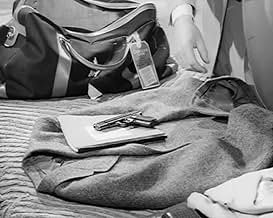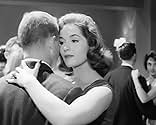The wife of a night club owner frames an American writer for his murder.The wife of a night club owner frames an American writer for his murder.The wife of a night club owner frames an American writer for his murder.
John Adams
- Police Constable
- (uncredited)
Jimmy Charters
- Man in Windsor Lad Pub
- (uncredited)
Featured reviews
A corrective to anyone who thinks fifties Britain was perennially wet and overcast is this dour early Guido Coen quickie obviously shot during a hot, dry summer in those far off days when everybody smoked, phones had button 'A's and telephone exchanges still had human operators.
Like Fred MacMurray in 'Double Indemnity' crew-cut American import Alan Baxter narrates how he was ensnared by dragon lady Barbara Shelley (in arched eyebrows, painted nails and a polka-dot blouse) with a rich husband of more use to her dead than alive.
Good-looking but garrulous, it feels much longer than it's running time of only 66 minutes.
Like Fred MacMurray in 'Double Indemnity' crew-cut American import Alan Baxter narrates how he was ensnared by dragon lady Barbara Shelley (in arched eyebrows, painted nails and a polka-dot blouse) with a rich husband of more use to her dead than alive.
Good-looking but garrulous, it feels much longer than it's running time of only 66 minutes.
This recently viewed feature is almost as bland as the washed out, whiter shade of pale print in which it appeared.
Everyone seems to be pulling out all the stops to give it the noir treatment: Alan Baxter is the obligatory American lead, retrospectively relating his ill fated encounters with siren Barbara Shelley, being needled by the sound of a familiar record, but still capable of a few cool colloquialisms, "The smart little number behind the desk," being a case in point. William Talman lookalike, Geoffrey Hibbert appears as a smarmy shady private dick. An unexpected twist creates faint echoes of Double Indemnity and it's all overlaid with a consciously trendy jazz score.
However, a pervading, quintessential Englishness drains the movie of any real grit or cutting edge. Much of the action takes place around leafy, affluent Marlow, with visits to the Windsor Lad pub and it's promo for Courage Ales. The then protracted process of making a phone call via the operator is conducted with decorum and dignity. Everything is so respectable, that even the chase occurs on attractive, rambling rural roads - Baxter's hot pursuit thwarted by a tractor hauling a cart loaded with hay blocking his path. All that's missing is the local yokel, with straw dangling from his lips observing from a nearby gate.
It is all fairly entertaining, but in an inescapably slight and superficial way. 'The End of the Line' manages to avoid hitting the buffers, but in spite of the rustic settings doesn't exactly pull up any trees either!
Everyone seems to be pulling out all the stops to give it the noir treatment: Alan Baxter is the obligatory American lead, retrospectively relating his ill fated encounters with siren Barbara Shelley, being needled by the sound of a familiar record, but still capable of a few cool colloquialisms, "The smart little number behind the desk," being a case in point. William Talman lookalike, Geoffrey Hibbert appears as a smarmy shady private dick. An unexpected twist creates faint echoes of Double Indemnity and it's all overlaid with a consciously trendy jazz score.
However, a pervading, quintessential Englishness drains the movie of any real grit or cutting edge. Much of the action takes place around leafy, affluent Marlow, with visits to the Windsor Lad pub and it's promo for Courage Ales. The then protracted process of making a phone call via the operator is conducted with decorum and dignity. Everything is so respectable, that even the chase occurs on attractive, rambling rural roads - Baxter's hot pursuit thwarted by a tractor hauling a cart loaded with hay blocking his path. All that's missing is the local yokel, with straw dangling from his lips observing from a nearby gate.
It is all fairly entertaining, but in an inescapably slight and superficial way. 'The End of the Line' manages to avoid hitting the buffers, but in spite of the rustic settings doesn't exactly pull up any trees either!
Alan Baxter never amounted to much of an actor, and by 1957 he was increasingly involved in B and TV productions. In THE END OF THE LINE, he is plainly too old, dumpy and unfit to credibly interest female beauties of the caliber of Barbara Shelley and Jennifer Jayne, and that is apparent from the outset. Plus he is too wooden to convey any real emotional dilemma over the killing of a man he just planned to rob.
BIG minus there.
Charles Saunders does a passable job of directing, making competent use of a predictable screenplay whose best feature is a voiceover that comes in fits and starts and appears to be Selby (played by Baxter) ruminating over his downright avoidable decisions that inevitably lead him to crime.
Barbara Shelley has the plum role as the scheming femme fatale with strings pulled by subtle villain Ferdy Mayne, and the screen comes alive when those two are on it.
Photography is strictly standard.
Not a bad watch if you have 62' to spare.
BIG minus there.
Charles Saunders does a passable job of directing, making competent use of a predictable screenplay whose best feature is a voiceover that comes in fits and starts and appears to be Selby (played by Baxter) ruminating over his downright avoidable decisions that inevitably lead him to crime.
Barbara Shelley has the plum role as the scheming femme fatale with strings pulled by subtle villain Ferdy Mayne, and the screen comes alive when those two are on it.
Photography is strictly standard.
Not a bad watch if you have 62' to spare.
Like a good number of British 'B' films made during the 1950s, this one offers a lead role for an imported American actor whose career had seen better days. In this instance Alan Baxter plays Mike Selby, a writer brought to England to give an American slant on a forthcoming play. The producer's daughter (Jennifer Jayne) finds him accommodation in a country hotel but this proves to be fateful. There he sees his former girlfriend Lilaine (Barbara Shelley) who is now married to Crawford, the hotel owner. She had originally run out on Mike to find someone with money but is now bored and apparently wants to rekindle their romance. After some initial resistance, Mike succumbs to her charms and is eventually persuaded to steal the jewellery that Crawford fences as a lucrative sideline. She concocts an elaborate alibi for him but things start to go wrong when Mike believes he has killed Crawford while stealing the jewels. Then he receives blackmail threats but who is blackmailing Mike, was Crawford really dead and what are Lilaine's real motives?
I was quite entertained by this second feature film which moves along nicely and throws in some twists along the way. However the performances of the two leads could not be more diverse. Alan Baxter seemed wooden and uneasy throughout whereas Barbara Shelley is cool and sexy. If fact her delivery at times reminded me of the young Lauren Bacall but sadly Baxter was no Humphrey Bogart. If possible, catch this film if only to see Barbara Shelley – she looks stunning.
I was quite entertained by this second feature film which moves along nicely and throws in some twists along the way. However the performances of the two leads could not be more diverse. Alan Baxter seemed wooden and uneasy throughout whereas Barbara Shelley is cool and sexy. If fact her delivery at times reminded me of the young Lauren Bacall but sadly Baxter was no Humphrey Bogart. If possible, catch this film if only to see Barbara Shelley – she looks stunning.
The End of the Line is a British 'B' film from 1957 and involves an American writer staying in England while he finishes his work but his experience there ends up being a lot more than he had expected. The story is fairly basic, with only a minor twist toward the last third of the film, but otherwise the script isn't all that memorable. As for the performances, Alan Baxter is quite underwhelming as the lead, although I don't hold it against him and feel he was simply miscast. The remainder of the cast are serviceable. The look of the film was fine, although some of the interiors were overlit. Overall a very average film.
Did you know
- TriviaThe opening scene show London's Ambassadors Theatre with a board advertising "5th year" of "The Mousetrap", the Agatha Christie play. It opened in 1952 and is still running [2020].
- Quotes
John Crawford: I want you out of the club in five minutes!
Charles Edwards: Be reasonable Mr Crawford. Alright alright I'll go. But you can't fool me. This isn't the real reason why you're firing me. And you know it as well as I do.
Details
- Runtime1 hour 2 minutes
- Color
Contribute to this page
Suggest an edit or add missing content

